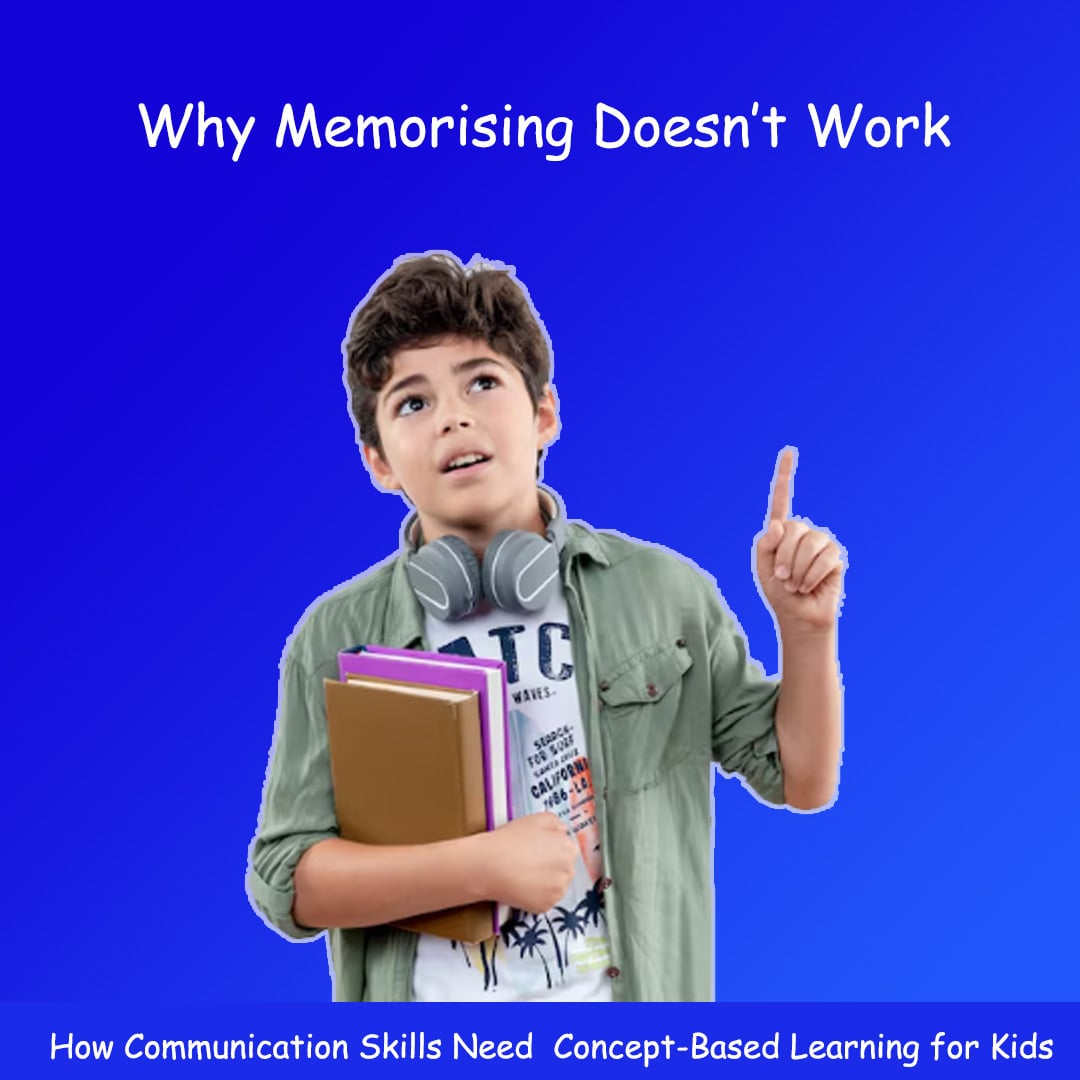Please enter the code we just sent to whatsapp 91-11-46710500 to proceed
Didn't Receive OTP?

You have most likely observed this scenario: when a child is about to take an exam, a notebook is open, with a long line of words, and a little child is reciting the words like a mantra over and over again. And you think they have memorised everything. And you question them, just like that, the spell is broken.
It is common practice to memorize new vocabulary, grammar rules, and even social phrases to teach kids. But the following is the truth that we tend to avoid: memorisation is not learning. And where communication skills are concerned, it is hardly effective at all.
Kids do not require a dictionary of memorised words.
They require knowledge, context, and association.
This is why the debate of language learning concept vs memorisation for kids is more important today than ever.
Here’s why iit is necessary not to memorize, and what children really need in order not to be shy, awkward communicators.
Memorisation: A Band-Aid Solution without a Bedrock.
Memorising can be very fruitful as it yields quick outcomes. It takes a child one evening to memorise ten vocabulary words. Ask them to repeat the same words in a sentence the following day, or they will forget them..
Due to the interaction of information with memorisation, there is
No meaning.
No story/context.
No real understanding.
When learning takes place in a real-life context and involves feelings, children will retain the information better. Where memorisation can be compared to the action of sticking notes on a wall, concept-based learning can be compared to the construction of the wall.
In simple terms:
Memorisation = short-term memory.
Learning concepts = long-term learning.
The acquisition of communication skills does not come from rehearsing sentences. It comes from the process of making sense with language.
The reason why communication skills require concepts and not cramming.
Communication entails listening, speaking, thinking, expressing, reacting, and connecting. It is much more complicated than word or phrase repetitions.
Here is where the right communication skills method children learn through can make a world of difference.
The reason is that Children need to know why, not what.
You can also tell a child to say, “Thank you”; however, the thing is, unless a child knows the concept of kindness, gratitude, and empathy, the phrase will be repeated without meaning.
The concept-led communication imparts:
Why do we express feelings
How tone changes meaning
In cases where courtesy counts.
The direction of communication through non-verbal cues.
Knowing the why aspect will assist children to use language in real life rather than in exams.
The Idea-Based Learning Produces Adaptable Thinkers.
Children who are only trained by rote learning will not work when the scenario changes slightly.
For example:
A child memorises:
"My favourite food is pizza."
But what if someone asks:
What do you like most of all to eat?
A child who has memorised a verbatim sentence may freeze.
A child who has been exposed to the idea of expressing preference will respond with confidence.
Ideas bring about flexibility.
Learning by heart induces dependence.
Actual Communication needs Creativity.
There is no checklist of communication. It involves being creative by using the correct words, modifying what you are going to say, and understanding the listener.
Concept-based learning provides children with:
Words in context
Visuals
Scenarios
Stories
Problem-solving situations
A learning child does not repeat, but they express.
Effective communication lies in this.
Role-playing in real life.
Fake play like the role of shopkeeper and customer or teacher and student helps children learn turn-taking, politeness, and expressiveness.
Visual Cue Cards
Illustrations help the children develop thoughts when they fall short of words.
They learn concepts like:
describing
comparing
asking for help
explaining needs
Discussion-Based Learning
Rather than asking children to memorise meanings, ask children:
"How would you use this word?"
Where do you see this in real life?
"Can you give me an example?"
Conversation Practice Every Day.
Talking about:
their school day
their emotions
their hobbies
their observations
assists them in language usage.
The Future of Communicators not Memorisers.
With the ever-changing world, children require more than the ability to repeat pre-learned lines. They must be able to:
express ideas
collaborate
disagree respectfully
solve problems
understand others
These powers can never be a result of memorisation.
They are based on experience, knowledge, and clarity of concept.
Children who acquire communication not by memorizing but by concepts learn to be confident and empathetic, expressive and insightful, and these remain with them throughout their lives.
Final Thoughts
Memorisation can be useful in the short run, but communication is key in the long run. Children must have real, meaningful, and understanding learning to make them good communicators, readers, writers, and thinkers.
To ensure that your child acquires real communication skills, you have to make sure that his learning methodology is oriented towards connection, context, and clarity, and not merely on repetition.
Shape Your Kid's Future with Bambinos Classes | Bambinos.live India's No. 1 English Communication Platform For Kids | Click here to Book a Free Class Limited time offer.